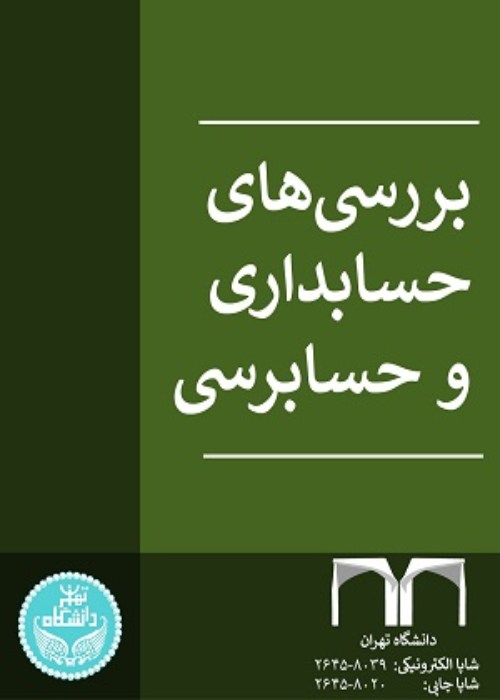Investigating the Role of Fair Value Accounting in the Value Relevance of Key; Accounting Items During the Financial Crisis in Investment Companies
Companies operating in global markets that prepare their financial statements based on international accounting standards adopted the fair value approach a few years before the start of the 2008 financial crisis as part of the new regulations of international financial reporting standards. However, there are still debates about the role of IFRS and reliance on fair value accounting in weakening the stability of the financial system. In other words, fair value accounting is at the center of discussion regarding the causes and consequences of recent financial crises. One of the ways to deal with such issues is through value relevance studies. These studies focus on the role of key accounting figures, such as book value of equity and net profit, in supporting and validating company valuation in various circumstances. Therefore, the main purpose of this research is to investigate the impact of investment companies' exposure to fair value accounting on changing the valuation roles of key accounting items in financial crises.
Considering its data collection method, this is a descriptive-correlational study. It is an applied study, carried out using the Ex-Post Facto approach. In this research, according to the type of data, the multiple regression method with panel data was used. The data needed for testing the hypotheses were extracted from the text of the audited financial statements of the companies and the stock exchange websites. Since studies are considered to be based on event-type value relevance, short-term intervals are much more effective, especially in the economy of Iran, where variables such as exchange rates are very influential on stock pricing. Based on this, the period of this research includes eight interim financial reporting periods from 21/06/2019 to 21/06/2021. The first four periods were considered as the ones before the crisis and the next four as the time of the crisis. According to the available information of 76 firms during eight seasons, the firm is limited to 608 firms-courses.
In line with the research question, three hypotheses were designed. The evidence obtained to examine the first hypothesis indicated that in companies with the least amount of exposure to fair value accounting, the earnings number has an increasing content of information compared to the equity book value. In this type of investment company, it is usually difficult to estimate the net value of assets and it is associated with measurement error. The evidence of the interaction effect between the number of assets reported with fair value and the equity book value showed that this factor does not have a significant effect on the valuation role of the book value of equity. This is while the coefficient of earning is negative and significant and indicates a less positive relationship between market value and earning (i.e. reducing the role of earning valuation) in the case of companies that are more exposed to fair value accounting. The estimation results of the second model, designed in line with the second hypothesis, implied that the result of the interaction of crisis with key accounting items is both positive and significant. Accordingly, during a financial crisis, the relationship between the value of earnings and the equity book value is strengthened. However, the increase in the value of the variable coefficient of earning in interaction with the crisis is greater than the coefficient of the equity book value. Based on the achieved results, during a crisis, investment companies can realize profit by selling shares, and the faster this happens, the better companies realize the remaining unrealized profits caused by the growth of prices during the boom. By realizing a profit, they prevent the decrease of their portfolio value during the recession. Also, investment companies with more potential to receive cash profits from investable companies during the recession can still be positively valued regardless of the decrease in the daily value of the portfolio due to falling prices. The result of the interaction of the simultaneous occurrence of the financial crisis and fair value accounting on the value relevance of the equity book value indicated the weakening of this relationship, and in the case of earning, it showed the strengthening of the relationship. Therefore, if both the influencing factors of the financial crisis and the level of exposure to fair value accounting are simultaneously considered, the value relationship weighting system of companies that are more exposed to fair value accounting and are in a financial crisis will be changed in favor of earning value relationship. In other words, for such companies, the book value of equity is reduced from the value relationship and the value relevance of earning is added. Accordingly, the findings of the empirical models indicated that: 1) companies that are more exposed to fair value accounting have a lower earning value relevance, 2) During a financial crisis, the equity book value and especially the net earnings increase, and 3) More exposure to fair value accounting during the financial crisis reduces the value relevance of the equity book value and increases the value relevance of earning.
If both the financial crisis and the level of exposure to fair value accounting are considered at the same time, the value relevance weighting system of firms that are more exposed to fair value accounting and are experiencing a financial crisis changes in favor of value relevance of earning. In other words, for this group of firms, the value relevance of the equity book value is reduced and the value relevance of earning is added. Therefore, the exposure of financial statements to fair value accounting should be considered as an influencing factor when studying the valuation roles of key accounting items, i.e. book value of equity and earnings, especially when companies are facing financial crises.
- حق عضویت دریافتی صرف حمایت از نشریات عضو و نگهداری، تکمیل و توسعه مگیران میشود.
- پرداخت حق اشتراک و دانلود مقالات اجازه بازنشر آن در سایر رسانههای چاپی و دیجیتال را به کاربر نمیدهد.




